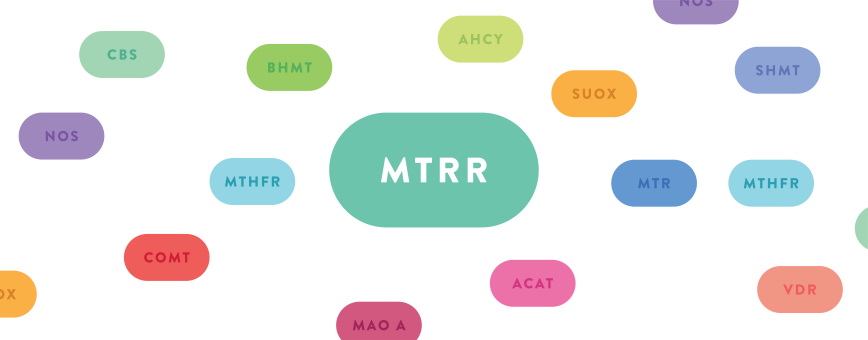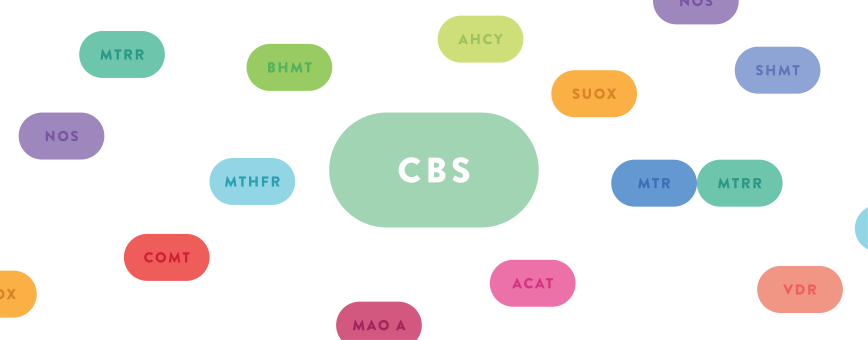The MTR gene gives your body instructions on how to make the enzyme methionine synthase. This enzyme works together with another gene product (MTRR) to regenerate and utilize methyl cobalamin (a form of vitamin B12) in the methylation cycle to help convert homocysteine to methionine.1 Methionine is a fundamental amino acid that your body needs.
Mutations in MTR have been associated with methyl cobalamin deficiency and high levels of homocysteine.2 High homocysteine levels may be a risk factor for heart disease and Alzheimer’s disease.3, 4
I’m not sure if I have a MTR mutation, how can I find out?
Our DNA Nutrigenomic Test identifies a custom panel of 30 single nucleotide polymorphisms (SNPs), designed by Dr. Amy. This panel tests for the A2756G MTR variation.
While there are thousands of genes and SNPs that can be examined, Dr. Amy has designed The DNA Nutrigenomic Test panel to focus on 30 SNPs that are part of the methylation cycle. This is a key nutritional pathway in the body that is central to health.
Many of the SNPs in Dr. Amy’s custom panel are in the control or regulatory portion of the gene, meaning these SNPs can have a significant impact on your health. These include some of the more unique SNPs on this panel and are not always covered by other DNA profile tests.
The analysis includes supplement suggestions based on personalized results and provides a comprehensive assessment of the methylation cycle. Proper function of the methylation cycle is essential for several key pathways in the body. When genetic mutations, or “weaknesses”, are present in this cycle, there may be increased risk factors for a range of health concerns. To learn more about the DNA Nutrigenomic Test and The Yasko Protocol, read our Getting Started Packet here.
How can I support my MTR mutation?
Nutrigenomic pathways are different between individuals and proper supplementation can help support specific imbalances. Holistic Health International offers a variety of supplements to support a MTR mutation within the SNP Support Category here.
Sulfite Sensitive™ capsules were originally named after those with MTR/MTRR/SUOX mutations in their genetics. These capsules help support low levels of manganese and/or molybdenum, as well as individuals with high levels of taurine and/or sulfur. May be helpful for individuals struggling with chronic fatigue, issues with yeast, sensitive skin, and allergy intolerances related to sulfites.
You do not need to use every supplement listed in each category! Supplements are provided as options to discuss with your own health care professional, to gradually add in as you feel they are needed, and for additional consideration based on biochemical test results.
The beauty of looking at targeted SNPs in the methylation cycle is that it’s a nutritional pathway, meaning if you find a mutation or imbalance in your system, you have ways to support or bypass them.
The information expressed on this webpage does not constitute an attempt to practice medicine nor does it establish a doctor-patient relationship. Content on the site is for informational and educational purposes only. The information expressed is not meant to replace you working with a physician or health care practitioner.
Information and statements have not been evaluated by the U.S. Food & Drug Administration (FDA) and are not intended to diagnose, treat, cure or prevent any disease or be used as the basis for treating a particular symptom or disease. Any products discussed or endorsed are not intended to diagnose, treat, cure or prevent any diseases or be used as the basis for treating a particular symptom or disease. If you have specific healthcare concerns or questions about the products displayed, contact your licensed healthcare professional for advice or answers.
References:
1. MTR gene 5-methyltetrahydrofolate-homocysteine methyltransferase. Accessed 2023, April 25. https:// medlineplus.gov/genetics/gene/mtr/
2. MTR 5-methyltetrahydrofolate-homocysteine methyltransferase [ Homo sapiens (human) ]. 2023, March 29. Accessed 2023, April 25. https://www.ncbi.nlm.nih.gov/ gene/4548
3. Ganguly P, Alam SF. Role of homocysteine in the development of cardiovascular disease. Nutr J. Jan 10 2015;14:6. doi:10.1186/1475-2891-14-6
4. Seshadri S, Beiser A, Selhub J, et al. Plasma homocysteine as a risk factor for dementia and Alzheimer’s disease. N Engl J Med. Feb 14 2002;346(7):476-83. doi:10.1056/NEJMoa011613










